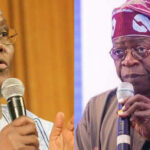
Pan-Africanist and global human rights activist, Patrick Lumumba, says trust deficit in governance in many African countries is impeding democracy and the development of the continent.
Lumumba, who is a founding trustee of the African Institute for Leaders and Leadership, stated this in a keynote address he delivered at the second edition of the Goodluck Jonathan Foundation Democracy Dialogue Series held at the Nigerian Content Development and Monitoring Board Tower Hall in Yenagoa, Bayelsa State, on Thursday.
The theme of this year’s dialogue was “Breaking New Grounds in the Democracy-Development Nexus in Africa”.
The former director of the defunct Kenyan Anti-corruption Commission pointed out that trust was one majority element lacking in African governments and democracies, adding that the time had come for Africa to examine what constituted democracy.
Lumumba, while commending the GJF for organising the democracy dialogue, said, “We are assembled here to remind ourselves that the reason why we lament about Africa is that it appears that the systems of governance that we inherited, and that we have been deploying for our benefit continue to put us at the foot of the ladder. We do not complain because there have been no changes or improvements in our circumstances.”
“This continent of Africa, this continent that is divided into 54 countries, is it not the time that we must examine what constitutes democracy? Is there something in our tradition of governance that we can take and help how we govern? Is there something like that?
“That is the question I want us to consider. Is there a possibility that the elections we hold, that we do not understand, are the disrupters of our democracy in Africa? That we spend so much time in them? And that the only thing that is lacking in African governments is actually trust. Do we trust each each other?”
Speaking at the forum, the President of ECOWAS Commission, Omar Touray, described the theme as “most appropriate and timely” as the dialogue took place at a time when the avowed goal of entrenching democracy and sustainable peace in West Africa was being put to a stern test.
He said, “Unconstitutional change of government, which involves military coups d’etat and unconstitutional maintenance of power by incumbents, have been on the rise in the recent past in Africa generally, and in West Africa, in particular, military coups have heightened insecurity, stagnated growth, increased poverty, inequality and limited popular participation in governance.”
In his remarks, the former President of Nigeria, Goodluck Jonathan, said the theme of the dialogue underscored the fact that “we need to see democracy beyond elections and critically look at the nature of our elections and what happens after elections by way of governance.”
He said, “Leadership should work towards ensuring that democracy translates into economic well-being of the citizens. We need to look at the gap in our democratic systems and seek to understand why democracy in many of our societies has been unable to guarantee peace and economic growth for the citizens.
“Democracy should be able to encourage development and help ensure social growth of the society. Democracy is about the people and should be able to uplift the social condition of the citizens. Democracy draws its strength from the people; we must work to ensure that its impact in the lives of the people is felt and appreciated.”
Jonathan further said, “As leaders, we have a responsibility to ensure that democracy endures by adhering to the rule of law, respecting the rights of the people, strengthening public institutions and ensuring that we implement policies that will impact positively on the lives of citizens.
“In recent years, democracy in the continent has gone through a period of crises, characterized by social tension, coup d’état, insecurity and poor management of election which itself is a threat to democracy in Africa.
“The challenges of poverty and unemployment and non-attainment of basic economic rights has created a crisis of trust in the hearts of citizens on the role and impact of democracy in our society. These issues have begun to question the fate of democracy as well as the impact on the peace, security and development of the continent.”
Also speaking, the Bayelsa State Governor, Douye Diri, appealed to the international community to observe the forthcoming governorship election in the state on November 11 with a view to protecting the integrity of the process.




